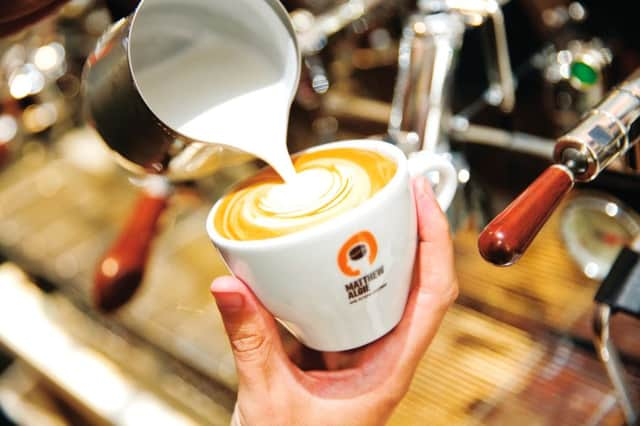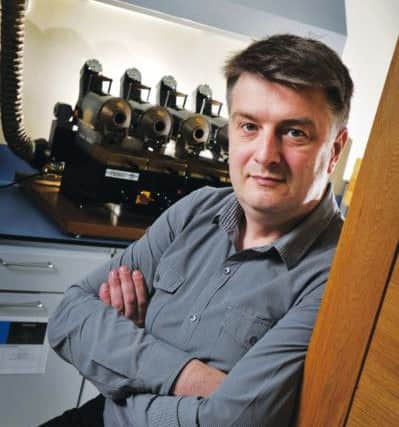Exploring Edinburgh's coffee culture


Legend has it that is was a herd of 9th century “dancing” goats, buzzing after munching on coffee berries in a field in Ethiopia, which first sparked a realisation of the energy-giving effects of caffeine. A passing monk is said to have spotted the lively goats and felt inspired to try drinking a concoction made from the berries. Needless to say, it resulted in a sleepless night.
Coffee has come a long way since then. In the 1960s and 1970s, Coffee Mate was king and a quick cup of instant granules was considered a perfectly acceptable option. Today we are embracing the Nespresso revolution which has seen many of us converted to the cult of coffee pods.
Advertisement
Hide AdAdvertisement
Hide AdThe days of coffee as merely a bitter caffeine delivery system are long gone. An intense espresso or an indulgent caramel latte are never more than a press of a button away. Companies are roasting special blends and many employ tasting experts or “blend masters” to help customers choose their perfect combination.


For Ewan Reid, technical director at Glasgow-based coffee company Matthew Algie, coffee has been the focus of his 23-year career. The firm employs a number of master roasters, many of whom have been roasting the beans and tasting the finished product for over 20 years.
“We use traditional drum roasters which are not as quick as large industrial roasters but we feel they give the best flavour profile,” says Reid. “
Roasting is almost a craft. It’s a blend of science and art. It’s a mixture of listening to what the roaster is doing, how the beans are behaving in the roaster, taste, touch, smell, it’s a sensory experience.
“It’s really important that the people roasting the coffee taste the coffee.”


At Matthew Algie, building strong relationships with coffee producers around the world is key. Now that artisan coffee is all the rage, customers are frequently asking about the provenance of the beans to ensure that it is ethically sourced.
“I spend several weeks a year travelling abroad to coffee producers. We have a lot of producers we have been buying from since the late 1990s,” says Reid.
“Ethiopia we travel to on a fairly frequent basis and I’m just back from Uganda and Kenya as well. I travel to Peru and Honduras nearly every year.
Advertisement
Hide AdAdvertisement
Hide Ad“We taste the coffee where we are travelling then prior to the beans being shipped we taste it, then when the coffee comes into the UK we taste it again and we bring it into the roastery in Glasgow.
“We certainly think that our role is very much taking what the farmer does and translating that through roasting.”
The coffee and tea industry is not something that immediately springs to mind when you think of Scotland but in fact coffee roasting is a rapidly expanding market.
October 2015 saw the first Edinburgh Coffee Festival at Mansfield Traquair. It brought together 27 artisan roasters, speciality tea stalls and coffee equipment companies from across Scotland.
Hot on the success of last year’s festival, plans are already afoot for a second event in the Capital.
But according to Philip Contini, chief executive of Edinburgh favourite Valvona & Crolla, Scots have adopted their own hybrid coffee culture which is a far cry from the traditional Italian ritual.
“Coffee is completely and utterly ingrained in the Italian way of life,” says Contini, who spends several months each year in his father’s native Naples.
“The first thing when two people meet up they will say hello and the second thing they will say is ‘do you fancy a coffee?’.
Advertisement
Hide AdAdvertisement
Hide Ad“They will then go to the nearest coffee bar and they will get to know each other if they don’t know each other already in the familiarity of the ritual of buying and consuming a coffee.
“It is the simplicity of coffee, of buying the coffee, that has been over-egged outside Italy.”
Perhaps it’s the colder climate, but sitting down for a long chat while nursing a warming latte is a familiar scene to most of us in Scotland. The range of caffeinated drinks available is vast, the original staple coffees having been adapted to suit our taste for sweeter, milkier concoctions.
“In Italy it’s just ‘un caffe’, a small shot we would call an espresso, the cappuccino which you would have in the morning and the macchiato,” explains Contini, who has the enviable job of being chief coffee taster and wine buyer at the Elm Row deli.
“It’s quick. Even in the morning you will go in and you will have a croissant or a flaky pastry and a cappuccino and it’s all done on your feet.
“The macchiato is the most milky that an Italian will take their coffee throughout the day after one milky coffee in the morning.
“It’s the fact that you are drinking hot milk after a meal, it doesn’t really work for your digestion. Italians cringe at the thought of all that hot milk hitting a full stomach.
“If you ask for a cappuccino at three in the afternoon they will know you are a tourist.”
Advertisement
Hide AdAdvertisement
Hide AdWith micro roasters on the rise in Scotland, we are finally embracing the taste of a good coffee. Mr Eion is a reasonably recent addition to the Stockbridge coffee scene, while branches of the longer established Artisan Roast seem to be popping up across the Capital.
“At Matthew Algie, we did some research about five or six years ago and we asked about 200 customers and 100 coffee experts from around the world what made a good coffee and there was no common agreement,” says Reid.
“Personally I love black coffee. I like to be able to taste the coffee. My favourite coffee changes season to season but right now I’m enjoying coffees that are processed naturally from Ethiopia.
“They will have some ripe stone fruit flavours like apricot, they are incredibly smooth and syrupy in terms of mouth feel and of course they change depending on when you drink them. When it is hot it will taste different to when it has started to cool down.”
Reid notes a real change in the Scottish coffee market, with more and more people looking to replicate barista coffee at home. Nespresso capsules are the easy option but they don’t create the most cost effective cup.
“People are still loving their espresso-based drinks but they are starting to look at what we would call brew bar coffees,” explains Reid.
“The great thing about those is that you can make them at home. You just need to invest in a brewer which is about £20-£30 and ideally a little grinder at home. You can make yourself an amazing cup of coffee.
“We are also seeing the rise of subscription services so there are roasters who are marketing through internet channels and you would maybe get a new coffee every two weeks or once a month.”
Advertisement
Hide AdAdvertisement
Hide AdBuy little and buy often is Reid’s tip for enjoying fresh coffee at home. “You should almost treat coffee like bread,” he says. “You want to buy from a roaster that roasts often and where you know when the coffee was roasted. That’s the key to fresh coffee.”
Contini is also an advocate of the coffee grinder for the best at-home caffeine hit.
“If you are buying retail to make it at home, the best way is to grind your coffee beans fresh and then to make that coffee in an espresso machine,” he advises.
“The pods that are available are wonderful, they are very convenient, but there’s something magical about having your own grinder, grinding your own coffee and making it yourself. There’s nothing to beat that.”
Valvona & Crolla: A Year at an Italian Table by Mary and Philip Contini (Ebury Press £27)
This article first appeared in EH50, the free magazine published by the Edinburgh Evening News and available to pick up in doctors, dentists and retail outlets or from the Evening News offices. An online version can be read here
